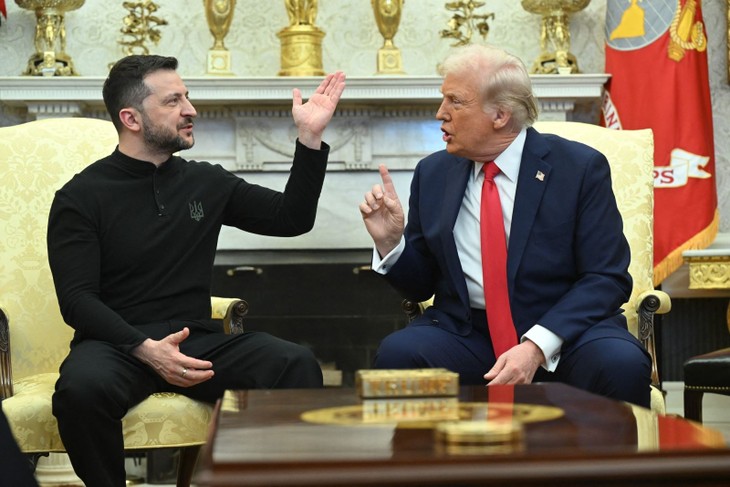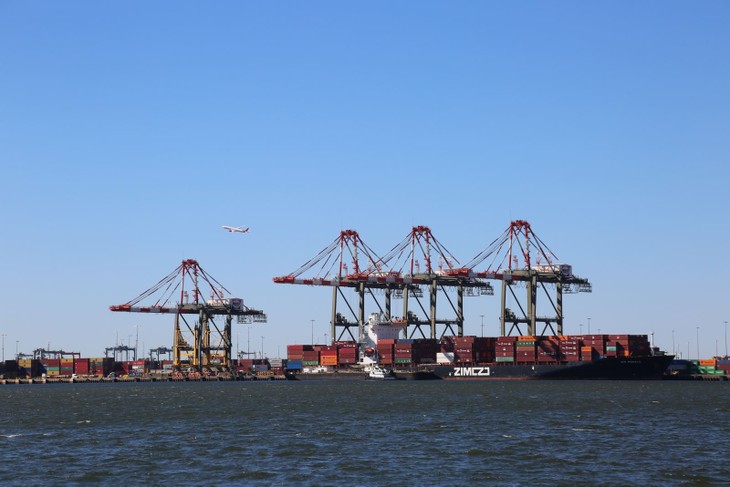(VOVWORLD) -April 30 is the 100th day of US President Donald Trump’s second term in office. Observers have analyzed the drastic changes that have occurred in the US’s domestic and external policies during that time, and the potential problems that lie ahead.
 US President Donald Trump meets Ukrainian President Volodymyr Zelensky at the White House on Feb 28, 2025. (Photo: Getty Images/VNA) US President Donald Trump meets Ukrainian President Volodymyr Zelensky at the White House on Feb 28, 2025. (Photo: Getty Images/VNA) |
Recent polls from major US media outlets show a decline in President Trump’s support rate in response to his drastic reforms.
Domestic challenges
In the NBC News Stay Tuned Poll released on April 27, just before the 100-day mark of his presidency, 55% of Americans said they disapprove of Trump’s job performance, while 45% said they approve. One month earlier, the disapproval rating was 51%, but 60% of respondents still believed that America was on the right track. Polls by CNN, the New York Times, the Washington Post, ABC News, and others also showed a slight decline in Trump’s approval rating.
The polling results have sparked mixed reactions in the US. President Trump and his supporters say these polls are based on unreliable methodologies and data, while his critics say they accurately reflect public sentiment. Observers say that, regardless of the polls' credibility, the current debate shows the uncertainty surrounding Trump’s policies, whose effects have yet to take clear shape.
Carolyn Kissane of the Center for Global Affairs at New York University said, “I think we will remember this period, probably the most massive pivot that we've seen in the United States, in terms of both the government and our position more globally.”
Among the domestic issues for which President Trump is facing backlash include his Department of Government Efficiency (DOGE) laying off hundreds of thousands of government workers, slashing budgets, and even shutting down multiple federal agencies. American households are increasingly worried about price inflation resulting from the administration’s tariff war against the US’s economic partners. Many do, however, credit the Trump administration with swift and strong immigration enforcement, according to Danielle Pletka, a researcher at the American Enterprise Institute.
“To watch how he has managed to close down illegal border crossings over his first 100 days, indeed this happened in the first month. You saw that from tens of thousands of people crossing every day, they were down to the single or double digits of people trying to cross the border illegally. That told us something very important that with will, it could be done what we needed. It’s the determination on the part of the president and in fact Joe Biden didn't have that determination.”
 Bayonne port in New Jersey, the US (Photo: Xinhua/VNA) Bayonne port in New Jersey, the US (Photo: Xinhua/VNA) |
Foreign policies
In 100 days, President Trump had made historic shifts in the US’s foreign policy, including new approaches to the Russia-Ukraine conflict, the Gaza conflict, the Iran nuclear program, relations with NATO allies, a controversial intention to annex Canada and Greenland, and a rollout of new tariffs on nearly every economic partner. Most of Trump’s new policies have encountered considerable backlash.
Trump’s pledge to resolve the Russia-Ukraine conflict “within 24 hours”, revised to “within 100 days”, has failed, aside from temporary ceasefires, as no major agreements have been reached despite the US’s efforts to mediate since late February.
Trump’s 90-day tariff pause to negotiate new trade deals reflects the difficulty of imposing radically new trade frameworks.
A big question right now is whether these foreign policy setbacks will force Trump to significantly alter his strategy. Emma Ashford, an expert at the Stimson Center, says Trump’s current foreign policy views are largely unchanged from his first term (2016-2020), which emphasized the use of power to achieve objectives under the “America First” doctrine, so the challenges encountered so far are unlikely to get him to change his stance.
Matthew Dallek, a political science professor at George Washington University, said, “Politically I think Trump was more cautious in some ways. I mean he was back off a little bit more frequently in the first term when he came under political pressure. We saw a little bit of that when he put a 90-day pause on these recent tariffs.”
Most observers say there may be adjustments to the US’s strategic foreign policy goals, but no major changes are expected, and these policies will continue to significantly impact international relations.